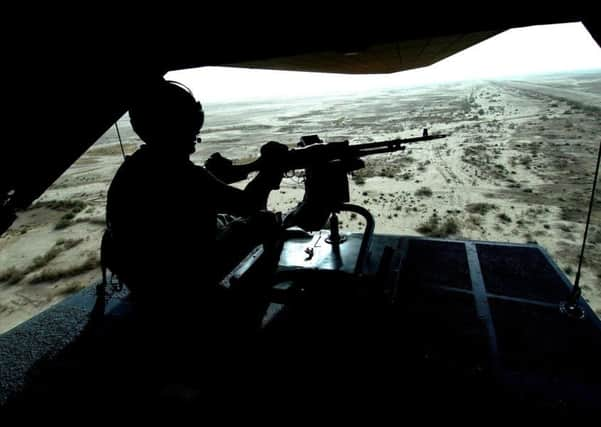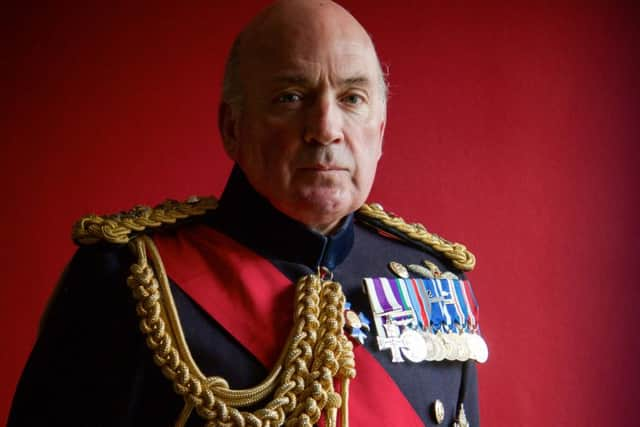Lord Dannatt - Why we need a bigger army


IN 1945 Britain, along with the United States and the Soviet Union, was one of the big three global powers.
We had emerged from the Second World War battered and bruised but victorious. In many ways, though, it was the high point of our influence in the last century.
Advertisement
Hide AdAdvertisement
Hide AdDuring the intervening 75 years the world has radically changed and, whether we like it or not, our status has diminished. This is reflected by the size of the British Army. In 1945 it contained 2.9 million people and today it’s just 79,000 – not enough to fill Wembley stadium.


The Army and its changing role in the world is the focus of General Lord Dannatt’s new book – Boots on the Ground: Britain and her Army since 1945 – and this evening he’ll be talking about it at the Royal Armouries in Leeds.
Dannatt was head of the British Army between 2006 and 2009 and is now a crossbench peer and well placed to make an assessment. “The British Army has been on stage in virtually every act of this unfolding saga from 1945 to the present time. Whether it’s been the occupation of Germany, the partition of India, the Korean War and so on.
“Back then we still had an empire and now our country has changed and the army has changed with it,” he says. “We are what we are, which is a bit of a middle-ranking European country although we still retain a world view.”
Advertisement
Hide AdAdvertisement
Hide AdSince leaving Iraq and Afghanistan the British Army is now in the unusual position of not being involved in any major campaigns.


Some would argue this justifies having a smaller Army and reducing the defence budget, but Dannatt doesn’t see it that way.
“If you look around at the world one has to admit it’s a pretty uncertain place. So even though the Army’s not currently deployed on major operations it would be a brave politician, or Prime Minister even, who would say we would never have to put British soldiers on the ground in large numbers anywhere in the world. The key thing is we have a sufficient set of Armed Forces, in particular a large enough Army, to meet whatever the future challenge is going to be.”
Dannatt, perhaps not surprisingly, is among those who would like to see the army grow rather than shrink. “As a close ally of the US as well as being one of the five permanent members of the UN Security Council we’ve always exerted a fairly considerable influence in the world, largely through our ability to have capable Armed Forces and being willing, on the UN’s behalf, to use them.
Advertisement
Hide AdAdvertisement
Hide Ad“Therefore, with the small size of our Armed Forces at the present moment Britain runs the risk of being diminished further by not being able to do really effectively one of the things we’ve been very good at, which is using our military capability for wider purposes.”
With Britain leaving the EU and many politicians around the world nervously trying to second guess what a Donald Trump presidency is going to look like, Dannatt would like to see Britain take the initiative.
“Given that we are leaving the European Union and that Donald Trump coming in as US President says Europe’s got to take a greater share of responsibility for its own defence, wouldn’t it be good leadership by the UK to modestly increase our defence spending from two per cent to two-and-a-half per cent and show that we are playing a leading role in Europe? That would show we are good Europeans even though we won’t be part of the European Union any more.”
Europe, though, has become ill at ease with itself again which can be seen in the mutual distrust between Russia and the West. “We have not been magnanimous enough to Russia in the 25 years since the end of the Cold War and we’ve turned a potential ally, in the broadest sense, into someone we’ve antagonised and I think we’re paying the price for that now.”
Advertisement
Hide AdAdvertisement
Hide AdHe describes Vladimir Putin as “somewhere between a threat and a major irritant” and says this is all the more reason why Nato needs to show resolve when it comes to dealing with Russia.
Then there’s the conflict in Syria where Dannatt believes the West, and in particular the US, have shown an absence of leadership. “Barack Obama called himself the president to stop wars not to start them. But because the US leadership couldn’t decide what to do about Syria we’ve done very little,” he says.
Dannatt was head of the British Army during the conflict in Iraq and has since criticised the way it was handled. “Whether you think it was right for us to go in or not and whether you think we were conned by Tony Blair over the weapons of mass destruction business or not, what was undoubtedly a catastrophic failure was there was no plan worth the paper it was written on for what happened next.
“If there had been a more sensible plan to help replace the Iraqi government with a more moderate and sensible one, we wouldn’t have had the descent into chaos that happened over the period from 2003 to 2006.” This fuelled the rise of the so-called Islamic State (IS) and for Dannatt underlines the fact that we still live in dangerous and uncertain times.
Advertisement
Hide AdAdvertisement
Hide AdHe is concerned about how we will meet similar threats in the future with the resources we have. “Whereas 10 years ago we were able to have a large deployment in Iraq and Afghanistan simultaneously we could not do that today, we could do one, but we couldn’t do both.”
He is worried, too, about the impact this may have on our international standing. “If the US is going to take more of a leadership role it needs allies and it has always turned to the UK first. But if our military capability isn’t sufficient to be a useful ally to the US, in military terms not just in diplomatic terms, then we will become rather irrelevant to them.”
But he argues that a boost in defence spending could prevent this happening. “One has to look at the world today and take a backward glance. We’ve been involved in more interventions and difficult campaigns over the last 25 years than we have for quite some time.
“It’s difficult to say with any certainty that this is a period of history that’s passed and won’t be replicated in the next 10, 15, or 25 years. It probably will, which is why from a UK point of view we’ve got to make sure we’ve got a set of Armed Forces that are capable and well resourced for the 21st Century and currently we’re short.
Advertisement
Hide AdAdvertisement
Hide Ad“But another half a billion pounds would transform the army’s capabilities hugely and put us back in the position whereby we can be a useful ally in the future.”
Lord Dannatt is appearing at the Royal Armouries this evening. For more details go to www.royalarmouries.org
Boots on the Ground, published by Profile Books Ltd, is out now priced £25.